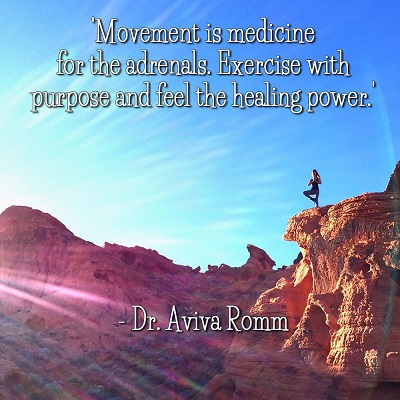 Exercise can play a role in supporting overall health, which includes the functioning of your adrenal glands. However, the relationship between exercise and adrenal health is complex and can vary depending on individual circumstances.
Exercise can play a role in supporting overall health, which includes the functioning of your adrenal glands. However, the relationship between exercise and adrenal health is complex and can vary depending on individual circumstances.
Sometimes over-exercising or over-training can harm your body, including your adrenals. Therefore, it is important to note that individual responses to exercise varies widely. What might be excessive for you, may not be for someone else.
Exercising for Adrenal Health
You need exercise to support your adrenals and heal any imbalances, but you need to do exercises that will help, not harm, such as the following:
.
Brisk Walking
Walking is one of the easiest and best exercises for the body because it is low-impact, but also very effective. Making your steps “brisk” makes your heart rate go up and helps improve your blood circulation and metabolism. It’s also gentle on your knees and hips, especially if you don’t walk on concrete paths or roads. Try to walk on the grassy edges.
Make sure that you wear comfortable running shoes and clothes. When you walk briskly, don’t walk at a speed where you are constantly out of breath. Pace yourself so you can take deep breaths easily.
If you’ve been leading a sedentary lifestyle, or little to no activity, it’s best to start small. Aim for 15 to 30 minutes of walking three times a week and gradually increase time and distance as your body adjusts.
Yoga
Don’t underestimate the power of yoga. You don’t need to go to classes, you can do it in the comfort of your own home. Check out all the free videos online! Yoga is one of the best exercises to reduce stress, which is a huge factor to address if you have adrenal fatigue.
Yoga is a meditative exercise that involves deep breathing. It requires stillness of the mind, as well as intentional movement. These can help improve your energy levels, physical strength, and stability.
There are different yoga exercises you can try. You can do some every day for 20 to 30 minutes, without putting added stress on your body.
Swimming
Swimming is a low-impact exercise that’s great at any time! Low-impact exercises, like swimming, prevent your body from demanding extra cortisol release, which could otherwise contribute to exhausting your adrenal glands.
Non-competitive swimming won’t overextend your body. It will help improve your blood circulation as well as keep your body moving and in better shape.
Stretching
On days that you don’t do active exercises, like swimming, walking, or yoga, you can do stretching. It will help relax your body and prevent stiffness or soreness in your joints and muscles.
Stretching helps increase your serotonin levels, which are hormones that aid in stabilizing your mood and make you feel good. Serotonin also helps reduce stress and other symptoms of anxiety and depression. All of these benefits contribute to improved adrenal health.
Low-Impact Interval Training
LIIT, or low-impact or low-intensity training, involves modified versions of high-intensity training routines with longer rest periods. HIIT movements involve 25 to 30-second bursts of activities followed by one to four minutes of rest.
With LIIT, you spend less time on the movements and a longer period of rest and recovery, which is more ideal for nurturing your adrenal glands. Start small with LIIT – 15 minutes a day twice a week will do. Then, as your body adjusts, you can scale up your routine with more circuits and repetitions.
Cycling
You can do indoor stationary cycling or ride your bike outdoors but just go steadily. Cycling is a cardio exercise which are essential for supporting your adrenals. When your goal is improving your overall health, keep your cadence at a rate that doesn’t put unnecessary stress on your body.
In Closing
Doing the right exercise to support adrenal health is important to ensure you don’t exacerbate your condition. Focus on low-intensity and restorative exercises, such as yoga, walking, swimming, and gentle cycling. Go out in nature as much as possible. If you are aiming to repair depleted adrenal glands, take care not to over-exercise because it can trigger adrenal crashes.
It’s also important to get enough sleep and eat an adrenal-friendly diet to balance your cortisol levels and support healing.






